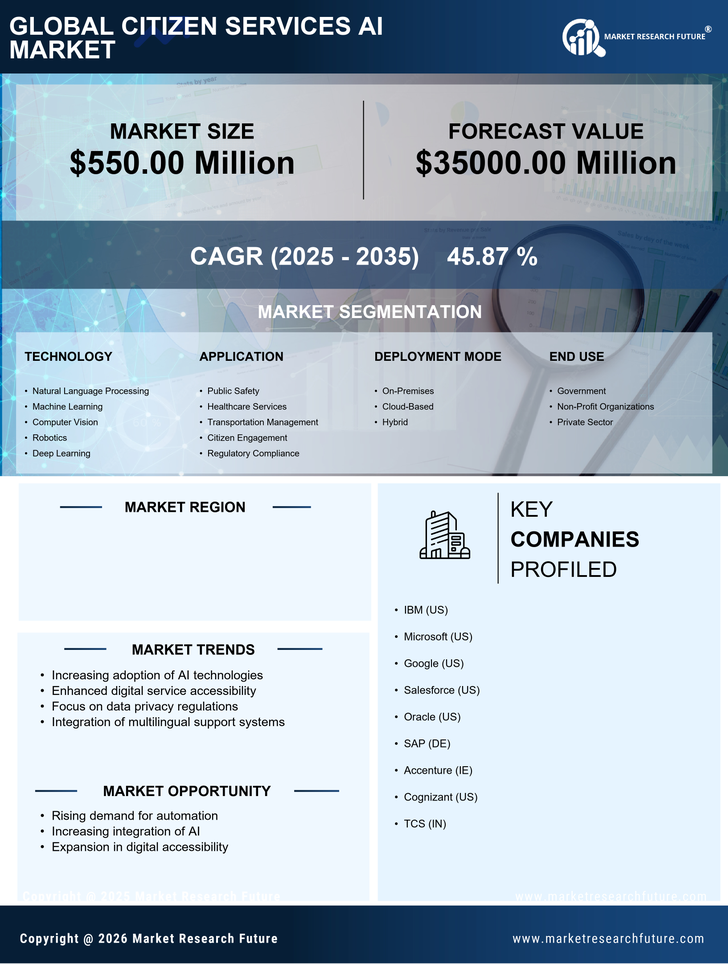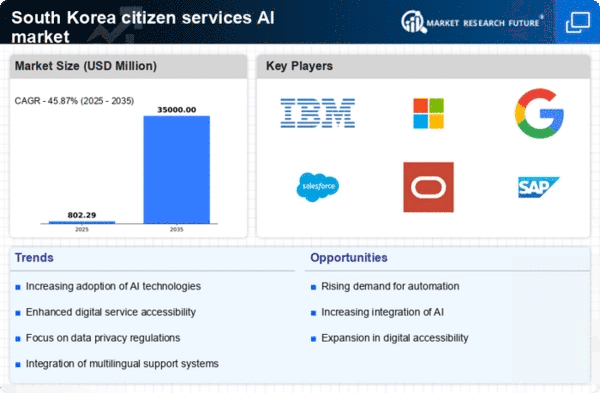Technological Advancements in AI
Technological advancements in AI are significantly influencing the citizen services AI market in South Korea. Innovations in machine learning, natural language processing, and data analytics are enabling more sophisticated AI applications in public services. For instance, the introduction of chatbots and virtual assistants has transformed how citizens interact with government agencies. These technologies can handle a wide range of inquiries, reducing wait times and improving service accessibility. As AI capabilities continue to evolve, the citizen services-ai market is likely to expand, with more agencies adopting these technologies to enhance their service offerings. The ongoing research and development in AI are expected to yield new solutions that address complex public service challenges.
Government Initiatives and Funding
In South Korea, government initiatives play a pivotal role in shaping the citizen services AI market. The government has allocated substantial funding to promote the development and implementation of AI technologies in public services. Recent reports indicate that funding for AI projects in the public sector has increased by 25% in the last fiscal year. These initiatives aim to enhance service delivery, improve citizen engagement, and foster transparency. By investing in AI, the government seeks to modernize its operations and meet the evolving needs of its citizens. This proactive approach not only stimulates growth in the citizen services-ai market but also encourages collaboration between various stakeholders, including tech companies and research institutions.
Focus on Enhancing Citizen Experience
The citizen services AI market in South Korea is increasingly focused on enhancing the overall citizen experience. Government agencies are recognizing the importance of user-centric service design, which prioritizes the needs and preferences of citizens. By leveraging AI technologies, agencies can personalize services, streamline processes, and provide timely information. Recent studies suggest that agencies implementing AI solutions have reported a 40% improvement in citizen satisfaction rates. This focus on citizen experience not only drives the adoption of AI technologies but also fosters a culture of continuous improvement within public services. As agencies strive to meet the expectations of a tech-savvy population, the citizen services-ai market is poised for sustained growth.
Growing Public Awareness and Acceptance
Public awareness and acceptance of AI technologies are crucial drivers for the citizen services AI market in South Korea. As citizens become more familiar with AI applications in their daily lives, their expectations for similar technologies in public services increase. Surveys indicate that approximately 70% of citizens express a willingness to engage with AI-driven services, reflecting a growing trust in these technologies. This acceptance encourages government agencies to invest in AI solutions, as they recognize the potential for improved citizen engagement and satisfaction. The citizen services-ai market is thus likely to benefit from this shift in public perception, leading to increased adoption and integration of AI in various public service domains.
Rising Demand for Efficient Public Services
The citizen services AI market in South Korea experiences a notable surge in demand for efficient public services. Citizens increasingly expect quick and effective responses from government agencies, prompting a shift towards AI-driven solutions. This trend is evidenced by a reported 30% increase in the adoption of AI technologies within public sector services over the past year. As citizens seek streamlined interactions, the integration of AI into service delivery becomes essential. The citizen services-ai market is thus positioned to grow, as government entities invest in AI to enhance operational efficiency and improve user satisfaction. This demand for efficiency is likely to drive innovation and investment in AI technologies, further solidifying the market's growth trajectory.

















